Japan-Thailand Relations
Japan-Thailand Summit Meeting
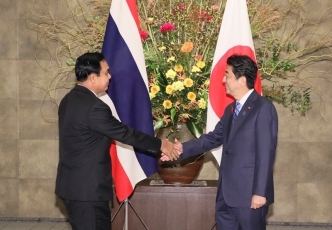 Photograph of the Prime Minister welcoming
Photograph of the Prime Minister welcoming the Prime Minister of Thailand
(Photo: Cabinet Public Relations Office)
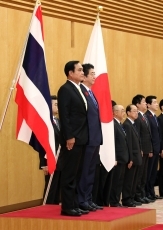 Photograph of the salute and
Photograph of the salute and the guard of honor ceremony
(Photo: Cabinet Public Relations Office)
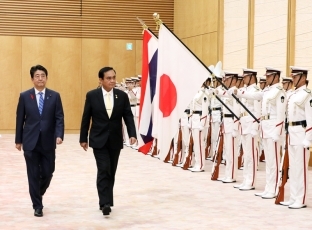 Photograph of the salute and the guard of honor ceremony
Photograph of the salute and the guard of honor ceremony (Photo: Cabinet Public Relations Office)
On October 8, commencing at 5:50 p.m. for 40 minutes, Mr. Shinzo Abe, Prime Minister of Japan, held a meeting with H.E. General Prayut Chan-o-cha, Prime Minister of the Kingdom of Thailand, during Prime Minister Prayut’s visit to Japan to attend the 10th Mekong-Japan Summit Meeting. The overview of the meeting is as follows.
The meeting was attended by Mr. Taro Kono, Minister for Foreign Affairs, Mr. Yasutoshi Nishimura, Deputy Chief Cabinet Secretary, Mr. Kotaro Nogami, Deputy Chief Cabinet Secretary, Mr. Kentaro Sonoura, Special Advisor to the Prime Minister, and other government officials.
In addition, following the meeting the two leaders held a joint press announcement.
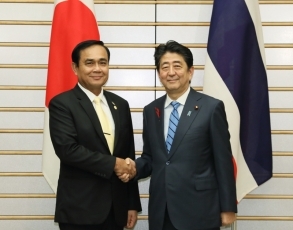 Photograph of the leaders shaking hands
Photograph of the leaders shaking hands
(Photo: Cabinet Public Relations Office)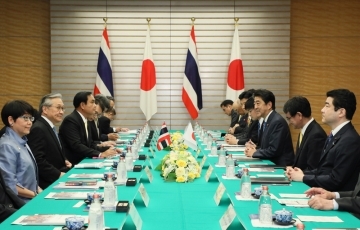 Photograph of the Japan- Thailand Summit Meeting
Photograph of the Japan- Thailand Summit Meeting
(Photo: Cabinet Public Relations Office)
1. Opening remarks
(1) Prime Minister Abe expressed his gratefulness at holding a summit meeting with Prime Minister Prayut for the first time in three years, and explained that he intends to further promote the relationship between Japan and Thailand as “strategic partners” supported by a long-standing and deep friendship and broad-ranging exchanges.
(2) In response, Prime Minister Prayut expressed his happiness at meeting again, along with stating that he hopes the regions affected by the recent spate of natural disasters in Japan recover promptly, and sharing his intention to support Japan if necessary. Prime Minister Prayut stated that on the basis of the two countries’ history of exchanges spanning more than 600 years, the success of the events commemorating the 130th anniversary of Japan-Thailand diplomatic relations last year, and the two countries’ “strategic partnership,” he wishes to promptly move ahead with further cooperation.
2. Thailand’s political situation
Prime Minister Prayut explained that Thailand is scheduled to hold a general election between February and May next year, and he is considering holding it in February if possible. In response, Prime Minister Abe expressed expectation that the process of restoring democracy in Thailand will move promptly ahead in the run-up to the general election in February next year.
3. Mekong cooperation etc.
(1) Prime Minister Abe expressed expectation that the Ayeyawady-Chao Phraya-Mekong Economic Cooperation Strategy (ACMECS), which Thailand is a driver of, will fulfill a central role in regional cooperation. Prime Minister Abe expressed the view that there is a strong affinity between Japan-Mekong Cooperation and ACMECS, and he hopes to deepen the discussion on concrete cooperation in the future.
(2) Prime Minister Prayut invited Japan to be a development partner for ACMECS, along with expressing expectation for Japan to cooperat with an ACMECS fund for supporting various cooperative projects under ACMECS from the financial front. Prime Minister Abe explained that Japan will consider becoming a development partner, while providing support to ensure that ACMECS’ activities become established.
(3) In addition, Prime Minister Abe conveyed that Japan will cooperate with Thailand, which is next year’s Association of Southeast Asian Nations (ASEAN) chair, towards the success of the series of ASEAN meetings.
4. Bilateral relations
(1) Prime Minister Prayut explained that Thailand has formulated a 20-year national strategy and is currently pursuing economic structural reforms relating to upgrade the industrial structure development of the Eastern Economic Corridor (EEC) and through the industrial human resources development, along with expressing gratitude for the ongoing support that Japan has extended in connection with Thailand’s economy for many years. Prime Minister Prayut expressed appreciation and expectation for Japan’s support in the field of industrial human resources development through, for example, the early establishment of Japanese technical colleges in Thailand.
Prime Minister Abe explained that Japan views the development of the EEC and industrial human resources development as the keys to realize advanced industry in Thailand, and Japan will cooperate proactively in these fields. In addition, Prime Minister Abe stated that Japan hopes to cooperate in fields such as smart cities by utilizing its technologies for the development of the EEC. Furthermore, Prime Minister Abe stated that he intends to accelerate concrete cooperation towards establishing technical colleges in Thailand for developing industrial human resource, and training the technical experts needed for advancing connected industries.
(2) The two leaders shared the view that amid mounting concerns of protectionism, they will cooperate towards the early conclusion of the Regional Comprehensive Economic Partnership (RCEP). Furthermore, Prime Minister Prayut expressed interest in Thailand joining the Trans-Pacific Partnership (TPP), along with requesting Japan’s cooperation to realize that goal. In response, Prime Minister Abe welcomed Thailand’s expression of interest in joining the TPP11, and explained that Japan will provide support by sharing necessary information and so on.
5. Regional situations
(1) The two leaders shared the view that it will be important to support specific initiatives by the governments of both Myanmar and Bangladesh in order to improve the situation in Rakhine State and the circumstances of refugees, and that they will continue to coordinate with ASEAN countries, which include Thailand, for the peace and development of Rakhine State.
(2) In addition, the two leaders held a frank and meaningful exchange of views on pressing issues such as the North Korea issue and the South China Sea, and shared the view that they will coordinate further. With regard to the North Korea situation in particular, they shared the position that the full implementation of the relevant United Nations Security Council (UNSC) resolutions is needed for the denuclearization of the Korean Peninsula. Prime Minister Abe also encouraged Thailand to cooperate towards the early resolution of the abductions issue, and Prime Minister Prayut expressed support for Japan’s policy with regard to the situation in the South China Sea.
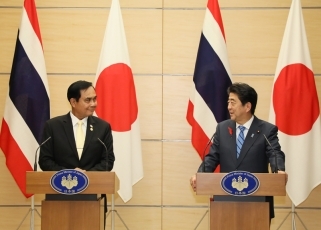 Photograph of the joint press announcement
Photograph of the joint press announcement
(Photo: Cabinet Public Relations Office)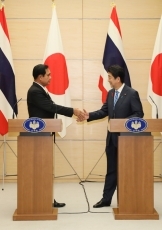 Photograph of the
Photograph of the
joint press announcement
(Photo: Cabinet Public Relations Office)

